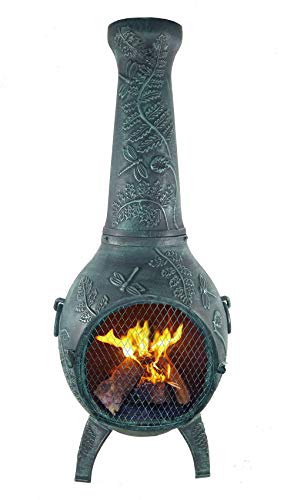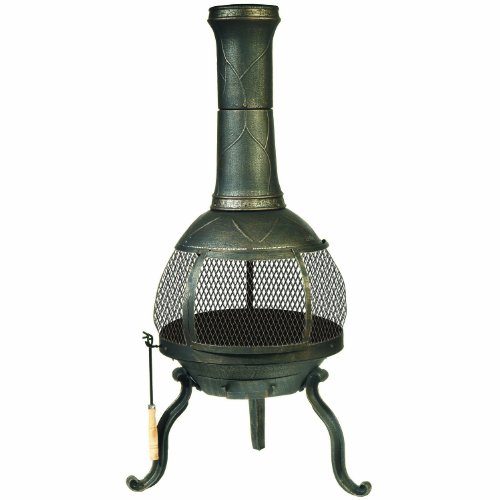Five Killer Quora Answers To Chimineas Sale

Bev
2024-09-20 14:47
17
0
본문
 Things You Should Know Before Buying a Chiminea
Things You Should Know Before Buying a ChimineaChimineas are a great addition to your backyard they provide warmth and ambience. There are some things you should think about before purchasing one.
Some chimineas, for example, emit toxic particles into the air. You can avoid this by using green fuels, such as bioethanol fire pits. They also require regular maintenance.
The History of the Chiminea
Chimineas are an extremely popular option for outdoor living spaces, warming them and giving off the welcoming glow of an open fire. They can transform an evening of cold and dark into a cozy spot to entertain family and friends or just relaxing. Chimineas are originally constructed from clay and other materials. They have evolved over time to meet a variety of aesthetic and practical requirements.
Traditionally, chimineas have a potbelly shape and a chimney, however they are also available in contemporary styles with more of an open design. They typically sit on a base that raises them off the ground and have a large opening to allow for the addition of firewood. Some chimineas have little to no exterior decoration while others feature painted, incised or raised details.
The earliest chimineas were made out of fired clay and were intended for cooking and heating. As these structures became popular they were adapted to suit different climates. Modernization of design and construction techniques made them more durable. Chimineas today are made of a variety of stone and metal, as well as clay, each having its own unique aesthetic and functional benefits.
Based on the type of chiminea you choose it will require regular maintenance to keep it in good working order. For example clay chimineas sale can be susceptible to cracking and degrading over time if are not properly stored during the winter. To safeguard them, apply a protective sealant that is specifically made for clay. You should reapply it every 3-6 months to ensure the best protection.
Metal chimineas can be damaged however they can also crack when they are not stored properly. To prevent this, store them in a covered area that will protect them from the elements and any snow or rain that might fall. To keep it from falling over, set any chiminea on an even and level surface. It should not be put under trees or over any other structure, such as a patio roof.
Chimineas are heavy and difficult to move. You can move a small clay chiminea across your yard or garden.
Their Function
Originally designed as functional cooking vessels for the town-dwelling Mexican tribes, these outdoor fireplaces are ideal for creating a cozy atmosphere. They can also serve as heaters by distributing heat through their chimney system. In addition, their aesthetic versatility enables them to be a part of a range of design styles.
Additionally they are also easy to manage and maintain, reducing the need for constant cleaning. Moreover, they can last for a long period of time if properly maintained and protected from extreme weather conditions. The quality of materials and maintenance practices used by homeowners will determine the life span of these products.
Chimineas are available in a wide range of materials, including traditional clay steel, cast iron and steel each of which has distinct aesthetics and durability. The second, on the other hand, has a more refined and polished appearance that is ideal for modern designs. Similarly, they retain heat exceptionally well, enhancing their effectiveness as outdoor heaters. Furthermore, they are constructed of eco-friendly materials, providing an alternative to relying on fossil fuels.
The daily impact of Chimineas on the air quality depends on factors such as the duration of use, the kind and moisture content in the wood as well as the efficiency of the design. Nevertheless, these units emit particles that can be harmful to human health, contributing to the pollution of the air and causing climate change. Making use of dry, well-seasoned wood and implementing a well-designed chiminea design can greatly reduce the impact.
In contrast to fire pits, which offer a wide and astonishing experience, chimineas are enclosed structures that limit the production of smoke. They are also designed to ensure that smoke is directed upwards to reduce potential health risks and nuisances for neighbours. The open fire pits can result in a significant amount smoke that can affect living areas.
Ultimately, the choice between a chiminea or a fire pit is dependent on your personal preferences, the functionality of the fire pit and price. Both are incredibly versatile and provide a distinctive aesthetic, but chimineas are a great option for those looking to create a cozy atmosphere with minimal effort. They are also simpler to manage once they have heated up due to their specialised design, making them a great alternative to outdoor fireplaces.
Materials
Chimineas are available in a variety of styles that can be adapted to any taste. They typically have a potbelly that tapers to the chimney. They can be made from clay, metal or cast iron. They're a great addition to any backyard patio or deck. They can provide warmth and ambience while also providing light. This allows you to spend more outdoor time. chimineas and fire pits are commonly used as an alternative to fire pits because they offer more aesthetic appeal and are more effective of funneling smoke away from the people who are seated around it.
Clay chimineas are created by hand, using local, raw clay. They are then fired in a kiln to burn off any excess materials and form a hard, water resistant surface. They are then sprayed with an anti-corrosive glaze to minimize the chances of cracking and warping. A chiminea may be stored outside year-round, except in bad weather. If stored outside, it should be covered and secured by a chiminea covering to stop the clay from becoming wet.
If it is made of clay, metal or cast iron, a chiminea can give a stylish, rustic style to your patio. They are designed to withstand high temperatures, making them ideal to cook on, and they are available in a variety of sizes. Some include a removable BBQ.
Before you buy a chiminea make sure that it is safe to use and has the proper ventilation. It is essential to place it on a non-combustible surface, such as a brick or concrete patio, and must not be placed on any kind of overhang like pergolas or roofs. It is important not to use water to put out the flames, as the sudden temperature shift can cause cracks in clay and terracotta chiminea.
Chimineas can be used outdoors, but in order to maintain outdoor temperatures, they should be broken in gradually by starting small fires and increasing the size of fire gradually. It is recommended to regularly clean your chiminea with an outdoor wood cleaner to avoid ash buildup and rust.
Environmental Impact
Chimineas can add warmth and ambience to outdoor spaces, but their use can cause harmful gases. Carbon monoxide is released when wood is burned in the chimineas. The gas that is a danger is not odorous or colorless and can cause respiratory issues and other medical conditions.
Gases like this can build up within enclosed structures such as chimineas, and can reach levels of toxicity. Carbon monoxide poisoning can cause unconsciousness or even death. It is also a major cause of global warming and air pollution and that's why it is essential to keep chimineas out of the sun and away from anything that could ignite.
In addition to carbon monoxide, chimneys may also emit particulate matter and other harmful pollutants. The size of the chimney and the kind of fuel used are both factors in this and dry wood fuels producing lower emissions than wet logs. Using a chimney with a spark arrestor can reduce smoke and PM2.5 emissions.
Although Chimineas sale have evolved through time but their basic designthe pot-belly base and an elongated chimney -- remains intact. This harmony between innovation and preservation is a testament to the respect for the traditional aesthetics that have been the reason that chimineas have become so popular across Europe and beyond.
Modern chimineas can be found in a variety of designs and materials that can be adapted to any garden design. Metal chimineas are more robust and more resistant to weather than clay chimineas which remain popular. They can be made from cast iron, cast aluminum or even stainless steel. They can also be shaped to suit your taste.
There are also slim and linear designs that don't sacrifice functionality. It is important to remember that a metal chiminea will require more frequent maintenance and care than a clay model, as it will be subject to thermal shock every time you start it up.
When selecting a chiminea it is recommended to go through the manufacturer's instructions thoroughly before starting a fire. It's also a good idea to purchase a cover for your chiminea while it's not in use to avoid any water damage or the accumulation of dust. It's also important to keep your chiminea clean and clean any ash before constructing an entirely new fire.


댓글목록0
댓글 포인트 안내